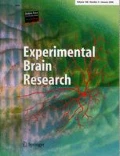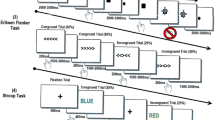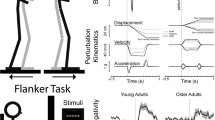Abstract.
Errors in reaction tasks are followed by a negative component of the event-related brain potential (ERP), the error negativity (Ne), which is thought to be a correlate of error detection. In the present study we show that, in tasks that induce different types of errors, the amplitude of the Ne was reduced in elderly (54–65 years old) compared with young subjects (19–25 years old). This reduction was also seen in single trials, as were computed for one of the visual tasks. Moreover, in this data set, the single-trial Ne was also delayed for the elderly compared with the young. These data suggest an alteration of error detection in the elderly, which is only marginally reflected in performance.
Similar content being viewed by others
Author information
Authors and Affiliations
Additional information
Electronic Publication
Rights and permissions
About this article
Cite this article
Falkenstein, M., Hoormann, J. & Hohnsbein, J. Changes of error-related ERPs with age. Exp Brain Res 138, 258–262 (2001). https://doi.org/10.1007/s002210100712
Received:
Accepted:
Issue Date:
DOI: https://doi.org/10.1007/s002210100712




